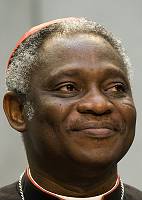I’ve had some spare time to read and so this morning I pondered the address given by Archbishop Agostino Marchetto, Secretary of the Pontifical Council for the Pastoral Care of Migrants and Itinerant People at the 2010 Conference of European University Chaplaincies, 14-18 June 2010. The title of the address is “Young hearts and minds toward ‘Peace, Reconciliation, and Social Justice.”
A few paragraphs that I thought would be germane for reflection and deeper prayer.
Pope John Paul II … wrote that “forgiveness is above all a personal choice, a decision of the heart to against the natural instinct to pay back evil with evil. The measure of such a decision is the love of God who draws us to himself in spite of our sin. Forgiveness therefore has a divine source and criterion. Forgiveness, as a fully human act, is above all a personal initiative (World Day of Peace message 2002). The ability to forgive lies at the very basis of the idea of a future society marked by justice and solidarity. Peace is essential for development, but true peace is made possible only through forgiveness and reconciliation” (ibid).
Pope Benedict XVI, in his Message to the youth in 2007, invited them to “dare to love” and not to desire anything less for their life than a love that is strong and beautiful: love that is capable of making the whole of their existence a joyful undertaking of giving themselves as a gift to God and their brothers and sisters, in imitation of the One who vanquished hatred and death forever through love (cf. Rev 5:13). Love is the only force capable of changing the heart of the human person and of all humanity, by making fruitful the relations between men and women, between rich and poor, between cultures and civilizations.
Pope John Paul II in fact was convinced that the future far lies in the hands of the youth. The future of peace lies in their hearts. To construct history, as they can and must, they to free history from the false paths it is pursuing. To do this, the youth must have a deep trust in the grandeur of the human vocation -a vocation to be pursued with respect for truth for the dignity and inviolable rights of the human person. Pope Wojtyla felt the feeling of the modern youth indeed. He said that he saw them being touched by the hunger for peace; that they are troubled by so much injustice around them and sense overwhelming danger in the gigantic stockpiles of arms and in the threats of nuclear war; that they suffer when they see widespread hunger and malnutrition and are concerned about the environment today and for the coming generations; that they are threatened by unemployment and many already without work and without the prospect of meaningful employment and are upset by the large number of people who are oppressed politically and spiritually and who cannot enjoy the exercise of their basic human rights as individuals or as a community. All this can give rise to a feeling that life has little meaning. In this situation, some may be tempted to take flight from responsibility: in the fantasy worlds of alcohol and drugs, in short-lived sexual relationships without commitment to marriage and family, in indifference, in cynicism and even in violence. Pope John Paul II invited them therefore to be themselves on guard against the fraud of a world that wants to exploit or misdirect their energetic and powerful search for happiness and meaning. He invited them not to avoid the search for the true answers to the questions that confront them (World Day of Peace 1985).
L’Osservatore Romano
June 23, 2010

